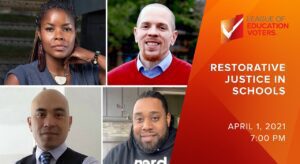Event Recap: Restorative Justice in Schools
By Lizzeth Mancilla
Engagement and Policy Intern
 Restorative Justice allows people affected by crime to communicate with the person responsible, often with the aim of a face-to-face meeting. This gives them the chance to talk about the incident. They can explain how it has impacted them, seek assurances that it won’t happen again, and agree on how to put things right.
Restorative Justice allows people affected by crime to communicate with the person responsible, often with the aim of a face-to-face meeting. This gives them the chance to talk about the incident. They can explain how it has impacted them, seek assurances that it won’t happen again, and agree on how to put things right.
This is what many people affected by crime want, which is why 85% of victims who go through Restorative Justice are satisfied with the experience. Restorative Justice also leads to a significant drop in re-offending, as it helps people who have committed crimes to recognize the harm they have caused. Restorative practice can also be used to address non-criminal harm.
In this Zoom meeting, we discussed Restorative Justice in schools, focusing on a healing approach to student behavior versus a penal approach. Our panelists discussed what brought them to the work, what their programs do, their philosophy, and where they can be found. They also discussed ways to expand these programs throughout Washington state.
Featured Participants:
- Toyia Taylor, Executive Director and Founder, WeAPP
- Sean Goode, Executive Director, Choose 180
- Saroeum Phoung, Executive Director, Peacemaking Academy
- Dion Schell, Director of Education, Community Passageways